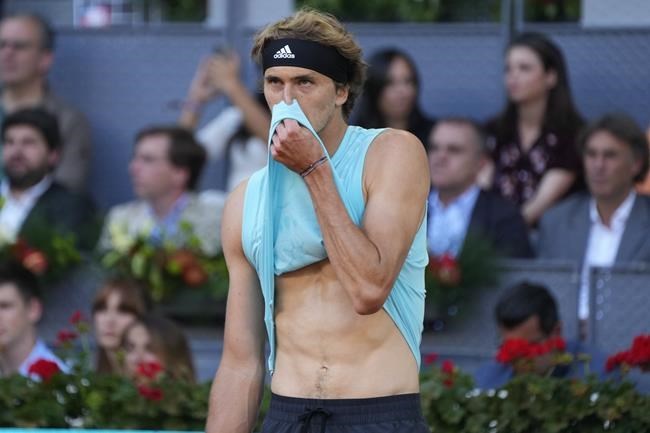MADRID (AP) — Alexander Zverev criticized the ATP Tour for its scheduling of late-night matches and said he was at a disadvantage in Sunday’s final against Carlos Alcaraz at the Madrid Open.
The third-ranked Zverev was overpowered by the 19-year-old Spaniard in straight sets.
Zverev conceded that he probably would have lost to Alcaraz even if he was “fresh,” but said that at least it would have been a “better final” if he hadn’t had to go to bed after 4 a.m. local time in the previous nights.
He said it’s a problem that has been happening on a weekly basis and he was getting “tired of it,” adding that the tour needs to do better to avoid being unfair with players.
“The ATP’s job was an absolute disgrace this week,” Zverev said. “To play a final against Carlos Alcaraz, who for me is the best player in the world right now, in a Masters 1000 event ... it is difficult. I had no coordination today. I had no coordination on my serve, I had no coordination on my groundstrokes. I missed two overheads that were super easy because I see the ball and everything is moving in my eyes.”
He said that during the warmup he already knew he would struggle.
“I was a little bit late all of the time. My first step was not so quick,” Zverev said. “If you are playing the best players in the world, you have to be at your top. Otherwise you will have no chance. Today I had no chance.”
Zverev started Saturday's semifinal match against Stefanos Tsitsipas at about 11 p.m. local time and the three-set match ended after 1 a.m. He returned to the “Caja Mágica” center court after the match to practice his service for a few minutes, then had to work with his physios and eat before getting back to the hotel.
“I think all of us have stayed up late, all of us maybe partied sometimes, but if you are staying up until 4 a.m., the next day you are dead,” he said. “I played the next day. If you’re doing it again, the next day until 5 a.m., you will have a difficult time to be even awake.”
Zverev also played in the night session against Felix Auger-Aliassime in the quarterfinals, when he won in two sets.
“I don’t want to take anything away (from Carlos),” Zverev said. “I feel sad for the final that we played, because this could have been a very good match. This could have been a great match.”
The regular scheduling of high-profile late matches has been a major source of frustration for the German player.
“It’s quite upsetting because it takes away a great match. It takes away the sport of tennis. Everybody wanted to see a great fight. Everybody wanted to see some high-level tennis. But I’m also human. I’m not a robot," Zverev said. "I can’t. I simply I cannot be on my level when this is happening every single night.”
Zverev also had to play late in Acapulco earlier this year.
“The chances are being taken away from me,” he said. “At the end of the day, everybody forgets about those things. Nobody talks about it, you know. Everybody says, ‘Yeah, it was a bad match, I made double faults, I didn’t play well’ and all of that. But look at what is happening the days before. Look at what is actually happening behind the scenes, as well. It’s not quite fair, I think.”
___
More AP tennis: https://apnews.com/hub/tennis and https://twitter.com/AP_Sports
___
Tales Azzoni on Twitter: http://twitter.com/tazzoni
Tales Azzoni, The Associated Press



